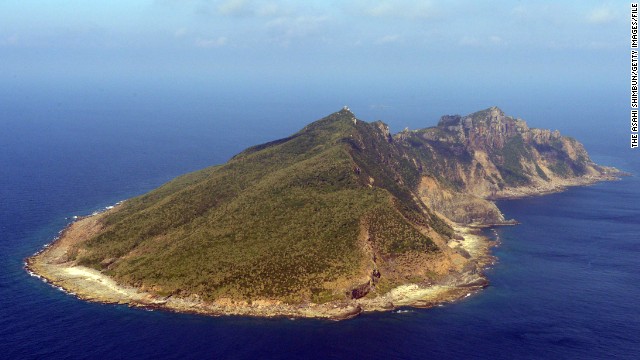1) Chinese expansionist move in the East Asia Sea defies Japan, imposes flight rules over islands.
2) US makes a statement in support of Japan.
3) China rebukes the US for its comments.
4) US flies military planes over islands in defiance of Chinese flight rules assertion.
US B-52 bombers challenge disputed China air zone
 The islands have been a source of tension between China and Japan for decades
The islands have been a source of tension between China and Japan for decades
The US has flown two B-52 bombers over disputed islands in the East China Sea in defiance of new Chinese air defence rules, officials say.
China set up its "air defence identification zone" on Saturday insisting that aircraft obey its rules or face "emergency defensive measures".
A Pentagon spokesman said the planes had followed "normal procedures".
The islands, known as Senkaku in Japan and Diaoyu in China, are a source of rising tension between the two nations.
Japan has dismissed the Chinese defence zone as "not valid at all" and two of its biggest airlines announced on Tuesday they would heed a request from the government in Tokyo not to implement the new rules.
'Normal procedures'
US Colonel Steve Warren at the Pentagon said Washington had "conducted operations in the area of the Senkakus".
"We have continued to follow our normal procedures, which include not filing flight plans, not radioing ahead and not registering our frequencies," he said.
There had been no response from China, he added.
The aircraft, which were unarmed, had taken off from Guam on Monday and the flight was part of a regular exercise in the area, US defence officials said. Both planes later returned to Guam.
The US - which has more than 70,000 troops in Japan and South Korea - had previously said it would not abide by the Chinese-imposed zone.
US Defence Secretary Chuck Hagel called it a "destabilising attempt to alter the status quo in the region". The White House said it was "unnecessarily inflammatory".
Japan has already lodged a strong protest over what it said was an "escalation" by China.
Taiwan, which also claims the islands, expressed regret at the Chinese move and promised that its military would take measures to protect national security.
In its statement announcing the air defence zone on Saturday, the Chinese defence ministry said aircraft must report a flight plan, "maintain two-way radio communications", and "respond in a timely and accurate manner" to identification inquiries.
"China's armed forces will adopt defensive emergency measures to respond to aircraft that do not co-operate in the identification or refuse to follow the instructions," the statement said.
Japan Airlines and All Nippon Airlines said on Tuesday they would stop filing flight plans demanded by China on routes through the zone following a request from the Japanese government.
Singapore Airlines and Australia's Qantas have both said they will abide by the new rules.
However, Australia summoned the Chinese ambassador on Tuesday to express opposition over the zone.
Foreign Minister Julie Bishop said "the timing and manner" of China's announcement were "unhelpful in light of current regional tensions".
http://www.bbc.co.uk/news/world-asia-25110011China slams 'inappropriate' U.S. remarks on territorial dispute with Japan
November 25, 2013 -- Updated 0708 GMT (1508 HKT)
STORY HIGHLIGHTS
- NEW: The Japanese Prime Minister says he is "extremely concerned" by China's move
- China released a map and coordinates that identify its "Air Defense Identification Zone"
- The zone includes islands at the center of a dispute between Beijing and Tokyo
- The U.S. has said the Chinese announcement creates "risks of an incident"
Hong Kong (CNN) -- China has told the United States to butt out of a territorial dispute with Japan in the East China Sea after Washington warned that a military claim by Beijing to airspace in the region raises the risk of "misunderstanding and miscalculations."
The creation of an "Air Defense Identification Zone" by China comes amid increasing tensions between Beijing and Tokyo over competing claims to disputed islands in the sea, which are believed to be situated near large reserves of natural resources.
China's announcement Saturday of the zone, which it described as an early-warning system for self-defense, drew a swift response from the United States, Japan's closest military ally.


No comments:
Post a Comment
All comments are welcome... especially any tips regarding corruption of the courts in Los Angeles. Anonymous tips are fine. One simple way to do it is from internet cafes, etc.